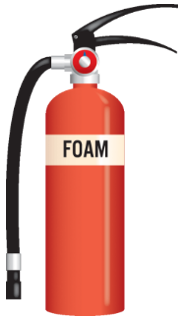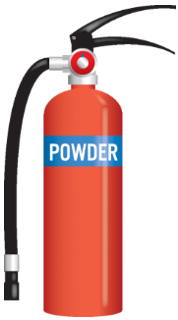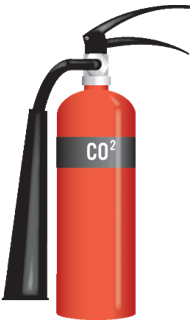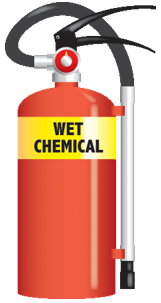Latest News
An Essential Site Skills Guide to Fire Extinguishers
Posted on Friday, 26th June 2020

Fire safety is an essential part of any workplace. Having the correct training and procedures in place can be the difference between life and death. It’s just over three years since the Grenfell Tower fire claimed the lives of at least 72 people, and this disaster has caused more building owners and workplaces to review their fire safety practices.
One of the most vital pieces of equipment in the event of a fire, are extinguishers. Fire extinguishers can help prevent the further spread of fire and reduce the amount of damage and injury it can cause. However, for extinguishers to be effective, staff need to know how, when and where to use them. In today’s blog, we look at the different types of fire extinguishers, which types of fire they should be used on, and the different training options available.
Why do we need different types of fire extinguishers?
We need different types of fire extinguishers to combat the different causes of fire. It is essential to consider the ‘type’ of fire before choosing an extinguisher, as using the wrong class can make the problem worse. For example, using water-based extinguishers on electrical fires can lead to the electronics being further damaged, causing dangerous reactions such as spreading fire or even explosions.
Every type of fire extinguisher has a distinct purpose and is primarily used to combat fires involving specific materials. It’s integral when purchasing fire extinguishers for your workplace to consider the environment and what types of fire are most likely to occur there. For example, if you are in an environment where there are a lot of cars, you need to consider extinguishers that can combat flammable liquid fires involving oil or petrol.
What are the six classes of fire?
The different classes of fire can be broken down into six specific groups, with each one reacting differently to the various types of extinguisher:
- Class A Ordinary combustibles - These are fires from solid materials such as wood, paper, plastic. Most extinguishers can be used on this class of fire.
- Class B Flammable liquids - Oil, grease and petrol fire all come under this category.
- Class C Flammable gases - Flammable gases, such as methane or propane, are particularly dangerous as violent chemical reactions can occur between the fire and the gas.
- Class D Flammable metals - As with Class C fires, chemical reactions can be produced by flammable metals such as titanium and magnesium.
- Class E Electronic equipment - This class of fire includes any fire stemming from electronic equipment. Electric and water are very reactive together, so non-water based extinguishers must be used here.
- Class F Cooking oils - These most regularly occur in kitchens when using chip pans or deep fat fryers.
What are the five types of fire extinguishers?
There are five main types of extinguisher which all use different substances to fight the different classes of fire:
- Water - The most common type of extinguisher. Should only used for Class A fires involving ordinary combustibles.
- Foam - Can be used on Class A and B fires. The foam in these extinguishers forms a 'seal' around flammable liquids to prevent further spread.
- CO2 (Carbon Dioxide) - Can be used on Class A, B and electrical equipment fires. The CO2 counteracts oxygen fuelling the fire to prevent it spreading.
- Dry-Powder - Can be used on all fires except those involving cooking oils. The properties of the dry-powder avoid creating chemical reactions when combating flammable gas and metal fires.
- Wet Chemical - Used primarily in kitchens for Class F fires, but can be used on Class A fires as well.
If in doubt, use the following colour-coding system to help you find out which type of extinguisher is right for which purpose:
| Class A Ordinary Combustibles | Class B Flammable Liquids | Class C Flammable Gases | Class D Flammable Metals | Class E Electrical Equipment | Class F Cooking Oils | |
 | Water | ✅ | ❌ | ❌ | ❌ | ❌ | ❌ |
 | Foam | ✅ | ✅ | ❌ | ❌ | ❌ | ❌ |
 | Dry Powder | ✅ | ✅ | ✅ | ✅ | ✅ | ❌ |
 | CO2 | ✅ | ✅ | ❌ | ❌ | ✅ | ❌ |
 | Wet Chemical | ✅ | ❌ | ❌ | ❌ | ❌ | ✅ |
What is an ABC fire extinguisher?
Class C, or Dry-Powder Extinguishers, are commonly referred to as ABC fire extinguishers. As the name suggests, ABC fire extinguishers are multi-purpose in design and can be used on class A, B and C fires. Having multi-purpose extinguishers can incredibly useful for many workplaces as it saves on the amount of equipment they need to buy and store.
Why do I need fire extinguisher training?
It is a legal requirement for workplaces to have adequate measures in place to deal with the risk of fire, as laid out in the Regulatory Reform (Fire Safety) Order 2005. This key government legislation states that employers must implement thorough strategies to reduce the risk of fire. Workplaces must also have systems in place to manage an outbreak of fire.
Section 21 of the Fire Safety Act makes specific reference to the training that needs to be undertaken at every workplace; all employees must be provided “with adequate safety training at the time when they are first employed”. The act also states training “must include suitable and sufficient instruction and training on the appropriate precautions and actions to be taken by the employee in order to safeguard…relevant persons on the premise.”
Extinguishers are a useful tool in combating fire, but without the correct training, they can cause more damage and injury. As part of your workplaces fire safety measures, ensuring that allocated staff members are trained on the correct use of extinguishers is key.
Fire safety training with Essential Site Skills:
At Essential Site Skills, we provide numerous courses to ensure your staff get the fire safety training they need. All of our training courses are of the highest quality and meet the necessary criteria to fulfil companies’ obligations under the Fire Safety Act 2005.
Fire Extinguisher Training
Our Fire Extinguisher Training course is an excellent means of getting staff members up to speed with the ins and outs of using fire extinguishers. Successful learners on this course will develop knowledge about the different varieties of extinguisher, when to use them, and how to perform inspections to ensure the equipment is suitable for use.
This half-day course contains practical, hands-on experience with extinguishers as well as theoretical learning. This includes an end of course ‘live fire’ scenario which acts as the final assessment. Here, participants will be asked to display the knowledge they’ve learned on the course by tackling a real fire.

Fire Safety Awareness
Our Fire Safety Awareness course provides participants with a foundation knowledge of fire safety in the workplace. Learners will develop theorical knowledge on the causes of fire and how to prevent them, as well as how to react in the event of a fire using emergency evacuation procedures.
This half-day course will provide theoretical knowledge of fire extinguishers but will not provide the hands-on experience which can be found in the Fire Extinguisher Training. If you think staff would benefit from both courses, why not combine to two courses to make a full day of fire safety training?
Fire Marshal/ Warden
It’s an employer’s legal duty to ensure there is always somebody overseeing the fire safety in the office. Our Fire Marshal/ Warden course is ideal to get the necessary training and qualifications to fulfil this role.
Our course covers many of the topics from our Extinguisher and Safety Awareness courses, as well as areas specific to the role of fire warden such as:
- Undertaking fire risk assessments and identifying fire hazards workplace
- The principles of effective fire evacuations and safety drills
- Ensuring fire and smoke alarms are fit and working
- Performing warden checks
To help during the Coronavirus, we are delighted to now be delivering this course through online video conference training. These sessions provide all the same information and qualifications as before, but utilising video conferencing software Zoom so you can train from home. Find out more about this new way of training here.
Level 2 Award in Fire Safety Training
For those who wish to have slightly more in-depth fire marshal training course, we also deliver the Level 2 Award in Fire Safety. This course covers many of the same areas of our Fire Marshal/ Warden course, but as it takes place over a full day rather than a half-day, allowing trainers to go into further depth with learners.
Fire safety e-Learning:
As well as the range of courses with our expert trainers, ESS also offer a variety of e-learning training options. E-learning courses can be completed entirely online, allowing learners to upskill and learn from home. Our fire safety courses include:
Find out more about e-learning from our dedicated blog entry. You can also find a full list of our e-learning courses on our website.
If you want to know anything else about our training and would like to speak to a member of our team, you can contact us by calling 0115 8970 529, or by emailing info@essentialsiteskills.com.


